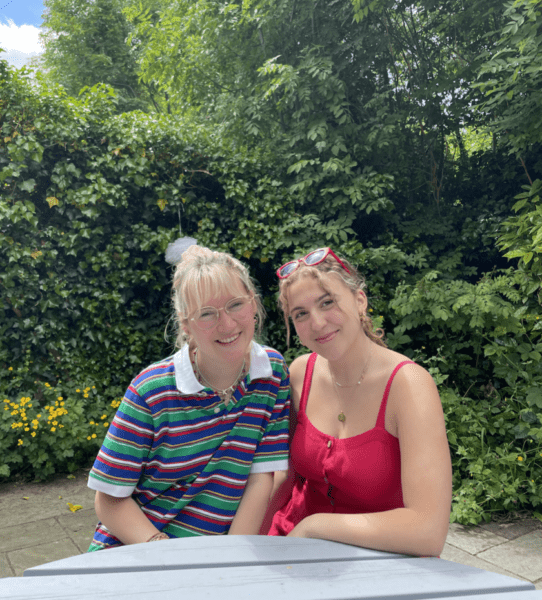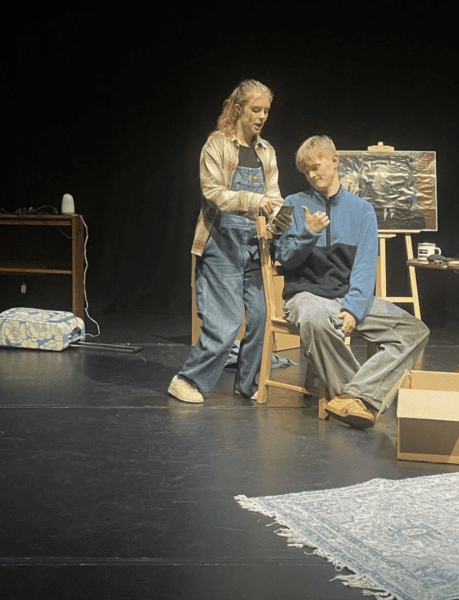Be Home Soon: Manchester at the Fringe
By Erin Osman

Biology student turned writer and director, Liliana Newsam-Smith, wrote her latest play, Be Home Soon, in the three weeks at the end of Summer 2022. The idea for the play had been buzzing in her head for some time, and so the process of writing, once started, materialised quickly.

Pictured: (Left) Producer Katie Tuson.
(Right) Writer and Director, Liliana Newsam-Smith.
She describes the play as a play about loss. Loss of people, of past times, of a younger self. It is a play about dreams, hopes, and nostalgia. About understanding oneself, and about how this process is often done through the learning of someone else. The play stars three characters, Raf (played by Arran Kemp), Mel (played by Evie Carricker), and Kaya (played by Natalia Leaper).
The play begins as Raf moves into his new apartment and meets his new housemate, Kaya, who he arranged to live with on a spare room app. Immediately, the play establishes itself as a very modern take on moving in, exploring the experiences of existing as a young adult in today’s world. As Raf unpacks his life and decorates his new place, we start to learn more about him, his past, and the circumstances that have led him to where he is now.
Liliana described Mel and Raf as being like the two sides of her mind. Mel is the kind of person who makes life happen. She is the kind of person who believes in the control and agency she has over her own life, too impatient to wait for life to happen to her. Raf, however, sits on the very opposite side of this spectrum. He’s scared to make decisions, too fearful of the consequences of what might or could happen. Liliana said that this idea, this definitional conflict between two people, was a relationship which she wanted to explore, interested to see how these two people would interact.
She hopes that it is a play in which the audience can come away without judgement for any of the characters. She wants us to relate to them all, to not feel any allegiance to any one character. Raf, Kaya, and Mel have all entered their twenties, and they are all figuring stuff out and making mistakes.

Pictured: (Left) Natalia Leaper
(Right) Arran Kemp
She spoke gushingly about the arts as a form of self-expression, and about the hugely rewarding process of “allowing other people to express the things they have inside them through the medium of what you’ve created.” She hopes that Be Home Soon will speak to people in this way, “make them feel heard or seen or understood.” If it achieves this, she says, it will have been worth it.
The first Edinburgh International Fringe Festival began in August 1947, with the aim to bring people and artists together from around the world in a way that might make theatre more accessible to creatives wanting to get their foot in the door. The festival has indeed become hugely successful, but its initial aim, to boost accessibility, has perhaps strayed. Producer Katie Tuson told me about this in more detail, explaining their difficulties in bringing Be Home Soon to this year’s Fringe.
Taking a show to the Fringe is, to put it bluntly, extortionate, with theatre companies having to take into consideration a multitude of different costs (venue, registration, accommodation, living funds, set, promotion). With a successful crowdfunder under their belt, the team behind Be Home Soon have worked hard to cover the majority of the costs, but the cast are still having to pay for a portion of accommodation costs.
Accommodation itself is incredibly difficult to find as, since landlords realised they could make a small fortune out of rent, costs have shot up exponentially over the past few years. Liliana described how the fringe has become, sadly, quite exclusive and elitist.
“It is a shame because the whole point of Edinburgh was that it was Fringe theatre, it enabled people to go up and do things they were just working on, contemporary pieces, diversifying theatre in general because of how inaccessible theatre is. It is a shame the Fringe is becoming more and more this way.” It seems that while the Fringe is still the best way for start-ups to get their theatre out there, it is not doing enough to support their talent.
Producer Katie described how she’s heard of people now having to rent in Glasgow, and then commute to Edinburgh so that they can put on their show. Rehearsals spanning over summer mean that while already having to pay to take their show to Edinburgh, the cast and production team are also unable to work jobs and earn money over June/July/August.
Katie also told me about the discrepancies between different theatre companies at different universities, and about how some universities, especially collegiate ones, benefit from rich donors who give lots of money back into their universities’ theatre societies. This again is testament to the very elitist nature of theatre, an elitism which seems to prioritise a particular kind of person to get their work out there.
While great funds do exist, like the Phoebe Waller-Bridge fund, which offers a £100,000 fund to assist performers taking theirs up the Fringe, these are still limited and are very competitive. It feels as if the Fringe have lost their initial aim of accessibility. How they might get this back feels near-impossible.
Despite this, student theatre companies across the country are still working hard to bring their shows up to the Fringe, putting on fundraiser events and opening crowdfunders to gather the funds together. The Be Home Soon production team are putting on one more fundraiser event on the 14th June, a quiz at Handlebar, which you can reserve your tickets to here.
Be Home Soon runs at Greenside at Infirmary Street (Olive Studio) From August 4 to 12. Check out The Mancunion‘s review of the Manchester run.







